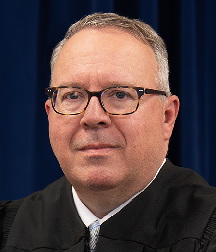
Honorable Christopher R. McDowell
Hamilton County Courthouse
1000 Main Street
Room 595
Cincinnati, Ohio 45202
Dan Blanton, Bailiff
Phone Number: 513-946-5785
Eric Dorfner, Staff Attorney
EDorfner@cms.hamilton-co.org
Phone Number: 513-946-5786
Fax Number: 513-946-5784
About Judge Christopher McDowell
Judge McDowell was appointed by Governor Mike DeWine to the Hamilton County Court of Common Pleas in August 2025. Before stepping into his role in September 2025, he enjoyed a fulfilling career as a partner at Strauss Troy in Cincinnati and also served as the prosecutor for the Village of Newtown and the City of Wyoming. Prior to joining Strauss Troy in 2015, he was an equity partner at Dinsmore & Shol’s Cincinnati office, where he practiced both civil and criminal law. Judge McDowell joined Dinsmore in 2000 after concluding active military service in the United States Army Judge Advocate General’s Corps, where he had the privilege of serving overseas in Korea, Germany, and Bosnia. During his military career, he took on roles as both a prosecutor and a criminal defense attorney. His last assignment was as the head of the criminal defense office at Fort Riley, Kansas, where he proudly provided all the criminal defense services for soldiers of the First Infantry Division.
Judge McDowell and his wife have three children.
Civil Cases
A. Case Management Conferences
Initial Case Management Conferences will generally be held in person in courtroom 595. However, the Court will liberally consider requests to conduct Initial Case Management Conferences remotely if the circumstances are acceptable. Remote appearances must be approved in advance by the Court or the Staff Attorney. Subsequent Case Management Conferences and status reports will be held in person or by telephone, based on the parties' preference or at the Court’s discretion. For all matters conducted by telephone, the parties shall call in to the Court together. Either party may initiate the conference call.
B. Settlement
Attorneys and parties are encouraged to pursue out-of-court settlements whenever possible. However, the Court is willing to assist in settlement negotiations if requested. When a case settles, the parties shall notify the Staff Attorney as soon as possible. Pending dates will be vacated, and the case will be scheduled for entry in approximately 30 to 60 days. If the parties need an extension to file a dismissal or notice of dismissal, they should call or email the Staff Attorney before the current entry date.
C. Discovery
The parties are required to conduct discovery in a polite and diligent manner. Motions to compel discovery shall not be filed until the parties have met and conferred, and made a good faith effort to resolve any discovery disputes. A motion to compel shall be a last resort and filed only after first contacting the Court to discuss the matter. For a telephone report, call or email the Staff Attorney. Disputes arising after the discovery deadline shall not be heard.
D. Motions
When either party files a Motion, that party shall inform the Staff Attorney by telephone or email that a motion has been filed. A courtesy copy of the motion, opposition, and reply shall be provided either as a hard copy or via email to the Staff Attorney. Additionally, each dispositive motion shall be submitted to the Staff Attorney as a Word document via email. The Court will set a motion for oral arguments upon request by either party or at the Court’s discretion. If a motion requires a hearing, the party filing the motion shall contact the Staff Attorney by phone or email to schedule a hearing date. The Parties shall notify the Court when the motion is ripe for decision. The Court will make every effort to resolve motions as quickly as possible. If a motion has not been ruled on within 30 days, the parties shall contact the Staff Attorney. Hearings and oral arguments will be conducted in person unless good cause exists to hold the hearing or oral argument remotely.
E. Calendaring and Continuances
The Court makes a conscious effort to resolve all civil cases within the appropriate time guidelines established by the Ohio Supreme Court. At the Case Management Conference, a trial will generally be scheduled within one year. Accordingly, continuances for trial dates are not liberally granted. However, the Court will grant continuances as appropriate, especially when both parties agree and good cause is shown (the failure to diligently conduct discovery is not “good cause”).
F. Pretrial Conference
Pretrial Conferences will be held in person in Courtroom 595. Pursuant to Local 15(B)(2), all parties must file their pretrial statements at least two days before the conference. A courtesy copy of the pretrial statement shall be provided to the Staff Attorney. The Pretrial Conference will cover settlement discussions, any outstanding motions, legal issues, trial logistics, and other related matters. Most Pretrial Conferences will be conducted by the Judge; however, the Staff Attorney will occasionally oversee the Pretrial Conference. During the Pretrial Conference, a deadline for filing motions in limine will be established.
G. Trial
Jury and bench trials will be held in courtroom 595. Once a jury has been empaneled, the trial will take priority until it concludes. If either party requests a continuance before the trial begins, the request must be made in writing and the Staff Attorney must be notified. Proposed jury instructions and interrogatories shall be emailed to the Staff Attorney at least two days before the trial starts. Each party must provide two Court copies of relevant exhibits.
H. Courtroom Etiquette
All attorneys and parties appearing before the Court shall dress professionally. Parties and attorneys must request permission to approach the witness stand or bench. All parties and attorneys with matters scheduled before the Court shall arrive, or call in, promptly at the scheduled time, or inform the court if they are running late. Speaking objections during trial are strongly discouraged. If argument or elaboration is necessary for an objection, it will be addressed at sidebar or otherwise outside the presence of the jury. Arguments of counsel shall be directed to the Court, not to opposing counsel.
I. Miscellaneous
All attorneys and parties are expected to be familiar with, and follow, the Ohio Rules of Civil Procedure, the Ohio Rules of Professional Conduct, the Ohio Rules of Evidence, and the Hamilton County Local Rules. Attorneys are responsible for the conduct of their clients.
Criminal Cases
A. Discovery Scheduling Conference
Defendants, generally, are not required to appear for DSCs. Defendants may or may not appear at the choice of their attorney or the Court.
B. Plea or Trial Settings
Following the DSC, each Defendant is entitled to two Plea or Trial settings. Cases may be set for additional Plea or Trial settings or pre-trials at the request of the Defendant or the State, only upon speaking to the Judge or scheduling a trial date. Defendants shall appear for all Plea or Trial Settings and pre-trials, unless good cause exists.
C. Motions
All motions shall be filed promptly. If a motion requires a hearing, the party must first file the motion and then contact the Bailiff to set a hearing date.
D. Miscellaneous
All attorneys and parties are expected to be familiar with, and follow, the Ohio Rules of Criminal Procedure, the Ohio Rules of Evidence, and the Ohio Rules of Professional Conduct. Defense attorneys and prosecutors are expected to appear in Court on time. If they have other matters to which they must attend, please call the Bailiff or check in with the Court as soon as possible.
